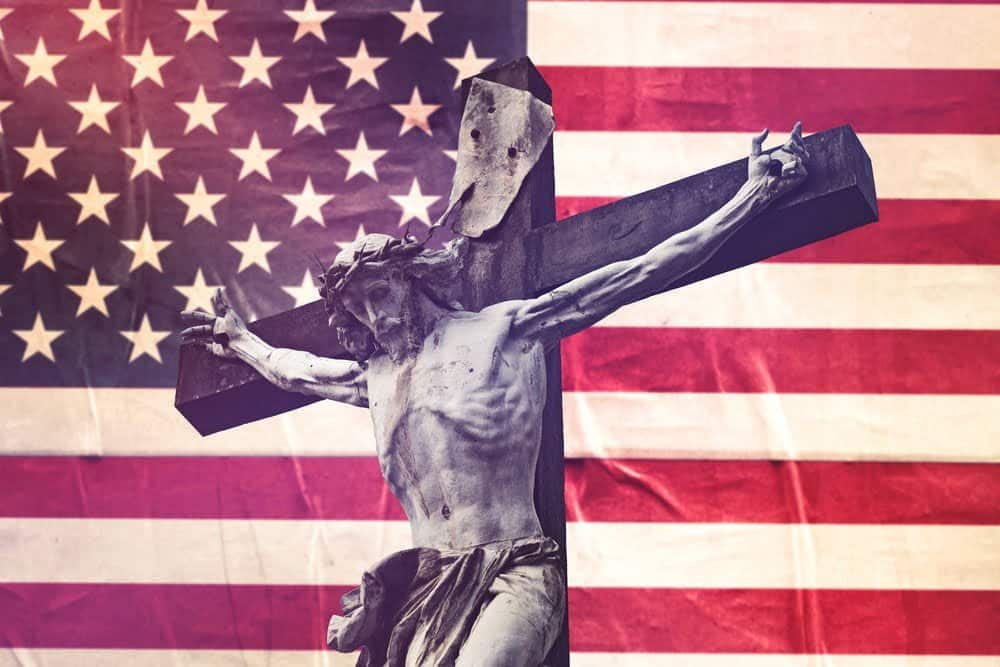The First Amendment provides that Congress shall make no law respecting an establishment of religion, or prohibiting the free exercise thereof;
In 2023, school vouchers got a double shot of steroids. In 2024, the push is on to inject more religion into education, by changing what we have long assumed the First Amendment says about religion and the government. More clearly than ever, some advocates vsee a path toward “taking back” education and creating a system of taxpayer funded Christian schools.
We’ve been inching up on this slowly but surely. Trinity Lutheran, Espinoza, and Carson are three Supreme Court cases that poked holes in the wall between church and state. Kevin Welner, director of the National Education Policy Center at the University of Colorado at Boulder’s School of Education, warned that in light of these three decisions, “states will probably be forced to let churches and other religious institutions apply for charters and operate charter schools.” The fact that charter schools may be described in state law as public schools will not matter.
In his dissent on Carson, Justice Breyer predicted right where we are headed:
What happens once ‘may’ becomes ‘must’? Does that transformation mean that a school district that pays for public schools must pay equivalent funds to parents who wish to send their children to religious schools? Does it mean that school districts that give vouchers for use at charter schools must pay equivalent funds to parents who wish to give their children a religious education? What other social benefits are there the State’s provision of which means—under the majority’s interpretation of the Free Exercise Clause—that the State must pay parents for the religious equivalent of the secular benefit provided?
Oklahoma is blazing a new trail by attempting to start up the first explicitly religious public charter school; St. Isidore of Seville virtual charter school would be owned and operated by the Catholic church as it would operate any of its private parochial schools.
As Heidi Przybyla reports for Politico, the defense of St. Isidore’s has drawn a broad group of supporters from the conservative orbit of Leonard Leo, including the Alliance Defending Freedom, the same crew that brought us the end of Roe v. Wade. Also in the group of lawyers defending the school is First Liberty Institute, the folks who took Carson all the way to SCOTUS, as well as the case of the praying coach. And the Notre Dame Religious Liberty Clinic is in there too. The Catholic Church is quite keen on the idea, as taxpayer funding would offset the drop in enrollment. Their argument is pretty simple – for 150 years, the Supreme Court was getting it wrong. Przybyla quotes Brett Farley, the executive director of the Catholic Conference of Oklahoma:
Jefferson didn’t mean that the government shouldn’t be giving public benefits to religious communities toward a common goal. The court rightly over the last decade or so has been saying, ‘No, look, we’ve got this wrong and we’re gonna right the ship here.’
The current version of SCOTUS is clearly ready to go on this. Kennedy v. Bremerton (the case of the praying football coach) signaled the end of the Lemon Test, but moreso it signaled that SCOTUS, in the pursuit of jamming Christianity into public education, was perfectly willing to just make shit up, deciding the case based on facts that were not actually facts.
How did we get here (or more precisely, how did SCOTUS drag us here)?
SCOTUS took a big brick out of the wall with Trinity Lutheran v. Comer. At the time of that decision, Noah Feldman, professor of law at Harvard University and former clerk to U.S. Supreme Court Justice David Souter, wrote:
It’s the first time the court has used the free exercise clause of the Constitution to require a direct transfer of taxpayers’ money to a church. In other words, the free exercise clause has trumped the establishment clause, which was created precisely to stop government money going to religious purposes.
Quick First Amendment refresher course:
The First Amendment has always included a tension between the establishment clause (the government can’t endorse any particular religion) and the free exercise clause (the government can’t get in the way of you freely exercising your right to worship as you choose). SCOTUS has generally favored the establishment clause, but it’s always been a tricky balance. So, for instance, it has been the understanding that if a student leads a prayer at a school gathering, that’s probably okay, and if a school staff member leads students in a school mandated prayer, that probably isn’t.
What we’ve seen most recently is not just a favoring of the free exercise clause, but an expansion of what free exercise even means.
One might assume that free exercise means that the government shouldn’t interfere with your attempts to freely worship as you please. The government cannot, for instance, forbid the Catholic Church to open any religious schools at all.
But the reasoning behind Carson, the argument increasingly heard, is that a private religious school can’t exercise its religion freely if it isn’t given access to the same sort of funding as public schools receive. In Carson, the court ruled that if Maine gave vouchers for students to attend a secular school, they must also give vouchers to attend private religious schools.
The Manhattan Institute, the right-wing think tank that employs Christopher Rufo, has just cranked out a report that argues, based on Carson and Trinity Lutheran, that “Unconstitutional Religious Discrimination Runs Rampant in State Programs,” claiming that states are “persecuting religious schools and charities.”
It offers numerous examples of this persecution. None of the examples involve the state actively interfering with the operation of various religious businesses, but simply not allowing these private religious entities to be paid with public taxpayer dollars.
In other words, you may think that persecution and discrimination might mean that the state comes in and tells the Catholic Church that it can’t operate a school, but at the moment, it means that the state won’t use taxpayer monies to help fund that school. Discrimination in this view is not just active opposition, but a failure to financially support.
And that is not the end of the free exercise expansion.In Carson v. Makin, Chief Justice Roberts argued:
In particular, we have repeatedly held that a State violates the Free Exercise Clause when it excludes religious observers from otherwise available public benefits.
“Otherwise available public benefits” is doing a lot of work here, but so is “excludes.” There is a sequel to Carson wending its way through the courts right now. One of the schools from Carsons is arguing that they are still being excluded because the state of Maine will not let them collect voucher dollars if they insist on keeping certain discriminatory policies, such as hiring only teachers who profess the correct version of a Christian faith.
The other enlargement of the free exercise clause says that one can only freely exercise one’s religion if one is able to freely discriminate against people to whom one objects.
That freedom to discriminate has been protected in many states where the voucher law explicitly declares that the state may not interfere with what the school teaches, how it operates, or its admissions process. The point is to guarantee that the taxpayer money will come with no regulatory strings attached. However, Pennsylvania is one example of a state with no such “hands off” rule that still allows voucher-accepting schools to discriminate on the basis of LGBTQ, disabilities, or just any secret rule that they don’t even have to explain.
There are a variety of legal terms wrapped up in all of these cases and regulations, but it’s important to grasp that when it comes to education in 2024, terms like “free exercise” and “discrimination” do not mean what the average citizen thinks they mean.
In this bold new world, if a school refuses to accept certain students or staff because they are LGBTQ or not of the right faith or require special needs or for non-specified reasons – that’s discrimination, but if the state refuses to hand over taxpayer dollars to that school because it refuses service for those reasons – that’s discrimination.
Some conservative folks can see the problems inherent in lowering that wall. In Oklahoma, opponents of the religious charter school have included the Republican attorney general, Gentner Drummond, who sees the school as a “slippery slope” that will lead to Oklahoma taxpayers being forced to fund non-Christian religious schools. In Ohio, homeschoolers have gone before legislatures to say that they do not want education savings account vouchers because they fear the government regulations that may follow.
Destroying the wall between church and public education will predictably open the floodgates for all manner of religious, semi-religious, faux religious, and religion-flavored grifter schools. Certainly the Satanic Temple, which has been making the point around the country via After-School Satan Clubs, can be expected to step up and show that opening the door to religions means opening to all religions, not just your own. But the “solution” hinted at by many folks like Ron DeSantis is even more alarming; the state taking on the power to determine which religion is “legitimate” and which is not.
As this push increases in 2024, expect the backlash to grow as well. Americans are so used to the notion of free taxpayer-funded public education for all that for many, the idea that their taxes may be funding a religious school that only accepts students it deems worthy – well, some folks aren’t going to believe such a thing could happen until they see it (and when they saw it in Illinois, they didn’t like it so much that they let the voucher law expire).
Americans like their public school system. Just as they have resisted anti-LGBTQ rules and book bans and other anti-public education measures once they saw that such things were real, they may push back on taxpayer-funded religious schools.By then it may be too late. If SCOTUS gets their hands on the St. Isidore case or a similar one, well … this is from their Kennedy decision, in which they made explicit the rejection of the Lemon Test for deciding if the Establishment Clause had been violated:
In place of Lemon and the endorsement test, this Court has instructed that the Establishment Clause must be interpreted by “‘reference to historical practices and understandings.“‘[T]he line’” that courts and governments “must draw between the permissible and the impermissible” has to “‘accor[d] with history and faithfully reflec[t] the understanding of the Founding Fathers.’”
Not sure how the Founding Fathers are going to get us there, but in their decisions so far, the court has made it clear where they’d like to go – a country where taxpayers are required to finance religious education, either through supporting traditional public schools that have had Christianity forcibly injected into them, or through supporting explicitly religious schools. Advocates for taxpayer-funded religious schools often try to paint secular education as a sort of competing religious view. But a secular school is one that simply leaves a space that students and their families can fill with as they see fit. That fits perfectly with the language of the First Amendment; requiring taxpayers to finance religious education does not.







